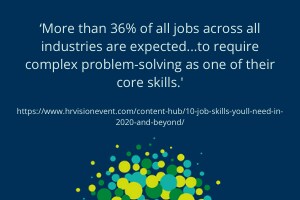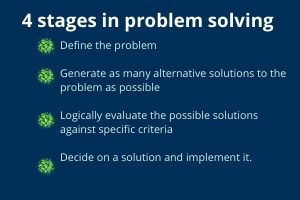Why Problem Solving Is A Key Workplace Skill
by

Matt Stevens, Head of TalentLens UK explains how to assess problem solving skills during staff recruitment and development.
Problem Solving appears alongside other core competencies in numerous organisational frameworks that are used in both recruitment and development. Problem solving is an everyday requirement. Often without even thinking about it, we solve problems ourselves or consult others for advice. People often solve problems by drawing on the prior experience of facing similar scenarios or situations. In the workplace however, demands are increasing, driven by the pace of change. Staff are often asked to analyse and solve new and ill-defined problems, or complete tasks without prior experience or clear concise data to tap into.
A vital skill
In terms of graduate and managerial competencies, complex problem solving is best defined as the "ability to solve novel, ill-defined problems in complex, real-world settings”
It is the most desired skill to have now and in the future: ‘More than one third (36%) of all jobs across all industries are expected by our respondents to require complex problem-solving as one of their core skills.’ [Source: HR Vision Event]

The ability to do this is termed abstract reasoning and this offers a good measure of what psychologists refer to as general cognitive ability or general ability. Ability tests, like Raven’s Advanced Progressive Matrices (APM III) – measuring abstract reasoning, are widely used to assess general ability and specifically the ability to solve novel problems, relevant to the workplace.
Measuring general ability
In addition to measuring problem solving and general ability, specific ability tests also measure other important abilities including verbal, critical thinking, mechanical and numerical reasoning ability as well as space relations. Most importantly for recruiters, ability tests are one of the most proven predictors of task performance and they are widely used as cost-effective, valid and objective measures of general and specific abilities required in a myriad of roles across nearly all organisations.
The stages in problem solving are:
- Define the problem
- Generate as many alternative solutions to the problem as possible
- Logically evaluate the possible solutions against specific criteria
- Decide on a solution and implement it

If you are looking for a job applicant’s ability to identify complex problems, develop and logically evaluate options and implement solutions, there are a number of tools and techniques you can use to assess this.
A number of the popular methods include:
| Tool/technique | When to use | Advantages |
| Psychometric tests | Screening/sifting applicants | Valid PROVEN predictors of the ability to carry out new and complex tasks. Fair, valid and cost-effective to use as screeners or at assessment centre Non-labour intensive. Can administer online for unsupervised completion. Platform scores tests. |
| Exercises involving the analysis of information | Assessment Centre - f2f / online | These measure the ability to analyse and process information, breadth of thought, evaluation of options, application of logic, relevance of information, the quality of solutions and the thought process behind decisions. Labour intensive. Assessors to evaluate presentation. |
| Competency based interview | Assessment Centre - f2f / online | These probe for examples of how the person dealt with real problems Labour intensive: 1-2-1. |
| Individual or group based exercises | Assessment Centre - f2f / online | These can measure a number of competency areas and often include problem solving abilities and the ability to arrive at an effective conclusion within the time allowed. Labour intensive to observe. |
General Ability Tests
Pearson TalentLens offers a wide range of ability tests; each one measuring different aspects of cognitive aptitude and ideal for graduate, managerial and supervisory roles. We offer the following tests for online or paper completion:
| Area Measured | Test | Target Roles |
| Level of ability to think critically - analyse written information and reach correct and logical conclusions. | Watson Glaser Critical Thinking Appraisal | Multiple. Any role where logical decision making is important. |
| Level of ability to reason with numerical data. | NDIT | Multiple - anyone whose role involves budgeting, forecasting and working with numerical data to spot trends etc., Finance, accounting and insurance sector roles, MBA and business schools. |
| Level of ability to solve new and complex problems for the first time, without prior knowledge - abstract reasoning. | Ravens APM | Multiple. One of the most respected measures of general ability. |
Get in touch!
To find out more about our psychometric tools, contact us for details.
[Image credit: Photo by Polina Zimmerman from Pexels]

